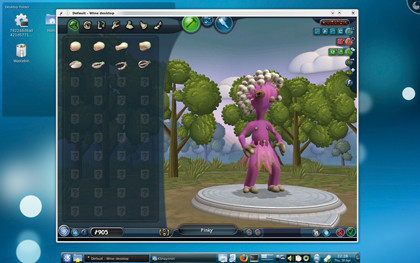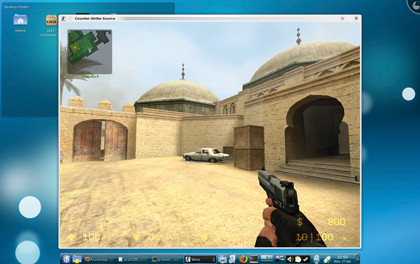Play Windows games on Linux with Crossover
Now there's nothing stopping you switching to Linux
Crossing over
When it comes to playing the games, Crossover Games is relatively straightforward to use. And in comparison to getting certain SecuROM titles to work on Windows, it can be considerably easier. But your first step has to be a check for compatibility.
Crossover hosts an online database that lists around 200 games titles that are known to work, and a few that don't. Compatibility is graded by gold, silver and bronze awards, and if your game wins any of these, you should be able to play it through without too much difficulty. Crossover judges compatibility against its own very high standards, and tries to be completely truthful about the faithfulness of a working game.
It's for this reason that there isn't a single game that has been awarded a gold medal, but there are over 20 with the silver title. According to Crossover's standards, this means the silver games 'install and run well enough to be useable', and titles include many Valve titles such as the Half Life 2 Episodes 1&2, Portal and Team Fortress 2. World of Warcraft, EVE Online and Guild Wars are reported to run well, and the latest 7.2 release of Crossover adds better support for Spore and City of Heroes.

UPDATES: The latest release of Crossover adds better support for games like Spore
In our experience, performance is usually a little below the equivalent XP speed. Using the Half Life: Lost Coast benchmark as an example, the Linux version (with the same settings) ran around 20 per cent slower, which doesn't make any difference considering the age of the game and that most modern hardware should be able to run it without difficulty.
Even if a title isn't in the database, it doesn't mean you definitely won't be able to run it. WINE, and hence Crossover Games, attempts to run any Windows executable you throw at it. If you like games from earlier on in the decade, for instance, there's a good chance that these games will run without any mention of their compatibility in the database. But you might also have some luck with newer games.
Sign up for breaking news, reviews, opinion, top tech deals, and more.
We were able to get Oblivion and S.T.A.L.K.E.R. to run by clicking on the executable from our shared Windows partition, although we couldn't perform the same trick with Bioshock, presumably because of the copy protection. We were also able to successfully run the Steam.EXE in the same way, running it from a mounted Windows partition. Steam even found the installed games list from our Windows installation, which saved both the space and effort from downloading them twice.
Steam is one of the best reasons for using Crossover. Thanks to its civilised anti-piracy mechanism and the download model, plenty of games and demos in its roster will run. From the Crossover application window, you can download and install and run the latest Steam client, which will in turn download your games to the Linux desktop. And if they don't work, you can always revert to Windows and use the same Steam account and play the game that way.

STEAMING: Counter Strike Source is one of the games you should be able to play with Crossover Games
Our biggest problem came from using a dual monitor configuration in Linux, as most games could only detect this as a single massive resolution through Crossover. Fortunately, there are two solutions. Either use the game's properties field to set a screen resolution or windowed mode, or force a virtual resolution in the Crossover Games configuration panel.
In our experience, Linux is much better at running a game within a window alongside your normal desktop applications, which can be a real boon if you like to run more than one EVE account at the same time.
The competition
If you want to delve into the details, there's plenty of room to change things in Crossover. Games are installed into something called a 'bottle', which is a term for a separate virtual Windows installation. This means you can keep bottles completely isolated from one another so that there's no conflict with shared libraries or other files. It also means one bottle can emulate Windows XP, while another could attempt Windows 2000 or Vista.
These options are dynamic, and you can change almost anything about each bottle through a properties manager that looks and feels much like the real thing on Windows. If you're looking to run Bioshock and Oblivion then there's a competitor to Crossover that will run both without problems.
Transgaming's Cedega is a private and purely commercial fork of the WINE project. It doesn't release its modifications back to the WINE project, and it uses a subscription model to keep its customers up-to- date. If your subscription ends, you'll still be able to use the software, you just won't benefit from any updates.
While this closed model goes against the philosophy of using Linux it does offer the Transgaming developers certain advantages. The biggest of which is their ability to licence the official anti-piracy code so that games can be installed and run from the original optical media. The result is that games like Bioshock run well on Cedega, along with over 40 other games that have been certified.
For several years, Cedega was the chosen platform for the semi-official EVE Online client on Linux. Using a slightly modified Windows executable tested for compatibility with WINE, it enabled Linux users to play EVE Online on their desktops. But in February this year, EVE support came to an end. The producer in charge of both the Linux and Mac clients cited lack of growth in the Linux market for the decision, and it seemed clear from the tone of his message that Linux uptake had been disappointing.
Fortunately, the game isn't over for EVE heads. Cedega still certifies the game as compatible, and the standalone premium Windows client seems to work well on Crossover Games. Many EVE users have even reported success using an ordinary WINE installation.
Supporting DX 10
In March, the CEO of the company behind Crossover – Jeremy White – laid out a roadmap for future development. He mentioned that his developers had spent the last year working hard on under-the-hood improvement such as .NET support, Gdiplus and DirectX.
As a result of this hard work, DirectX 9 compatibility is looking good in both Crossover Games and WINE. But his plans for the next release include the far more ambitious DirectX 10, and if development goes well, there may be a compatible version of Crossover Games released by the end of the year.
If Codeweavers can achieve this magic trick, there's a good chance that WINE could even be ported back to Windows, bringing DirectX 10 compatibility to older versions of Windows, such as XP and 2000, an irony that won't be lost on Linux users. While it's obvious that Linux is never going to be a hard-core gaming platform, Linux is also far from being a barren wasteland.
Technology like WINE and Crossover present enough potential to satisfy most persistent gaming urges, and over the course of the next 12 months, the situation is only likely to improve for Linux games. There's also a world of independent, free and open source gaming to delve into as well, and commercial small scale games like World of Goo have been very successful on the Linux desktop.
As with most things to do with Linux, getting things to work and run properly can be something of an adventure game in itself. But to those of us with a passion for the free desktop, that's the whole point.
-------------------------------------------------------------------------------------------------------
First published in PC Format Issue 228
Liked this? Then check out 50 handy Ubuntu tips
Sign up for TechRadar's free Weird Week in Tech newsletter
Get the oddest tech stories of the week, plus the most popular news and reviews delivered straight to your inbox. Sign up at http://www.techradar.com/register